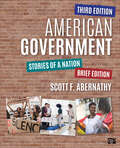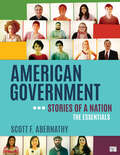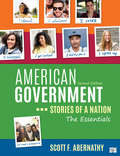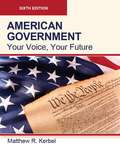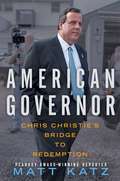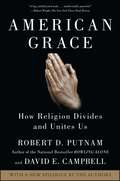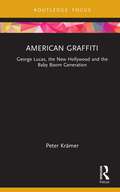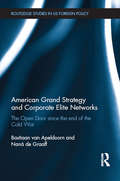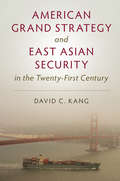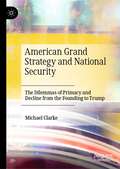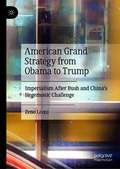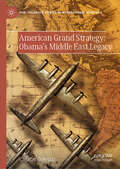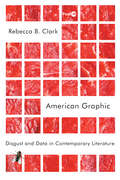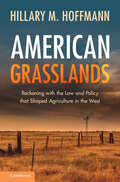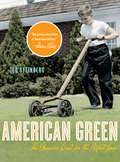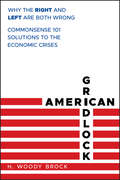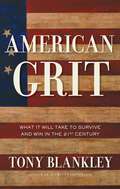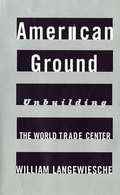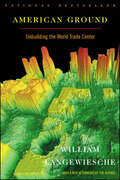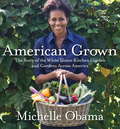- Table View
- List View
American Government: Stories of a Nation, Brief Edition
by Scott F. AbernathyAmerican government is not just one story—it′s many stories. Our stories. And they are still being told. In American Government: Stories of a Nation, Brief Third Edition, author Scott Abernathy tunes in to the voices of America′s people, showing how diverse ideas throughout our nation′s history have shaped our political institutions, our identities, the way we participate and behave, the laws we live by, and the challenges we face. His storytelling approach brings the core concepts of government to life, making them meaningful and memorable, and allows all students to see themselves reflected in the pages. Carefully condensed from the full version by Scott Abernathy, American Government, Brief Third Edition, gives your students all the information they need—and the stories they relate to—in a more concise, value-oriented package.
American Government: Stories of a Nation, Brief Edition
by Scott F. AbernathyAmerican government is not just one story—it′s many stories. Our stories. And they are still being told. In American Government: Stories of a Nation, Brief Third Edition, author Scott Abernathy tunes in to the voices of America′s people, showing how diverse ideas throughout our nation′s history have shaped our political institutions, our identities, the way we participate and behave, the laws we live by, and the challenges we face. His storytelling approach brings the core concepts of government to life, making them meaningful and memorable, and allows all students to see themselves reflected in the pages. Carefully condensed from the full version by Scott Abernathy, American Government, Brief Third Edition, gives your students all the information they need—and the stories they relate to—in a more concise, value-oriented package.
American Government: Stories of a Nation, Essentials Edition
by Scott F. AbernathyReal People. Real Stories. Real Politics. Politics involves people, from many backgrounds, struggling to make their voices heard. Real people, telling their stories, reflect our ideals, choices, and collective experiences as a nation. In American Government: Stories of a Nation, author Scott Abernathy tunes in to these voices, showing how our diverse ideas shape the way we participate and behave, the laws we live by, and the challenges we face. Each chapter features real stories illustrating how the American political system is the product of strategies, calculations, and miscalculations of countless individuals. Students learn the nuts and bolts of political science through these compelling stories. Learning concepts in context is a tested learning technique that works to help ideas stick. The key concepts are memorable because they are tied to real politics, where students see political action and political choices shaping how institutions advance or impede the fulfillment of fundamental ideas. Not only will all students see themselves reflected in the pages, but they will come to understand that they, too, are strategic players in American politics, with voices that matter. Just like the Full version, The Essentials edition is perfect for instructors who don’t wish to cover the last three chapters on policy.
American Government: Stories of a Nation, Essentials Edition
by Scott F. AbernathyReal People. Real Stories. Real Politics. Politics involves people, from many backgrounds, struggling to make their voices heard. Real people, telling their stories, reflect our ideals, choices, and collective experiences as a nation. In American Government: Stories of a Nation, author Scott Abernathy tunes in to these voices, showing how our diverse ideas shape the way we participate and behave, the laws we live by, and the challenges we face. Each chapter features real stories illustrating how the American political system is the product of strategies, calculations, and miscalculations of countless individuals. Students learn the nuts and bolts of political science through these compelling stories. Learning concepts in context is a tested learning technique that works to help ideas stick. The key concepts are memorable because they are tied to real politics, where students see political action and political choices shaping how institutions advance or impede the fulfillment of fundamental ideas. Not only will all students see themselves reflected in the pages, but they will come to understand that they, too, are strategic players in American politics, with voices that matter. Just like the Full version, The Essentials edition is perfect for instructors who don’t wish to cover the last three chapters on policy.
American Government: Stories of a Nation, The Essentials
by Scott F. AbernathyIn the Second Edition of American Government, Essentials Edition, author Scott F. Abernathy tunes in to the voices of all Americans, showing how our diverse ideas shape the way we participate and behave, the laws we live by, and the challenges we face. From the Constitutional Convention to Ferguson, Missouri, each chapter features rich, personal narratives that illustrate how the American political system is the product of strategies, calculations, and miscalculations of countless individuals. It focuses on real people, the actions they take, the struggles they face, and how their choices influence outcomes. The key concepts are memorable because they are tied to real politics, where students see political action and political choices shaping how institutions advance or impede the fulfillment of fundamental ideas. Participation is at the heart of this groundbreaking new text, with ample background on how and why to participate. Not only will all students see themselves reflected in the pages, but they will come to understand that they, too, are strategic players in American politics, with voices that matter. American Government, Essentials Edition, is identical to the full version of the text, minus the three policy chapters.
American Government: Stories of a Nation, The Essentials
by Scott F. AbernathyIn the Second Edition of American Government, Essentials Edition, author Scott F. Abernathy tunes in to the voices of all Americans, showing how our diverse ideas shape the way we participate and behave, the laws we live by, and the challenges we face. From the Constitutional Convention to Ferguson, Missouri, each chapter features rich, personal narratives that illustrate how the American political system is the product of strategies, calculations, and miscalculations of countless individuals. It focuses on real people, the actions they take, the struggles they face, and how their choices influence outcomes. The key concepts are memorable because they are tied to real politics, where students see political action and political choices shaping how institutions advance or impede the fulfillment of fundamental ideas. Participation is at the heart of this groundbreaking new text, with ample background on how and why to participate. Not only will all students see themselves reflected in the pages, but they will come to understand that they, too, are strategic players in American politics, with voices that matter. American Government, Essentials Edition, is identical to the full version of the text, minus the three policy chapters.
American Government: Your Voice, Your Future
by Matthew R. KerbelThis book was written with the instructor's pedagogical needs and the students learning needs in mind. It presents a comprehensive treatment of the subject, emphasizes critical learning skills, and connects theory to practice, while talking to (rather than past) the student in a conversational manner using modular text and interactive features that address how students learn. <P><P>It offers a comprehensive teaching and learning experience at an affordable price that will facilitate the teaching process while permitting instructors the flexibility to customize the book to how they teach the course. <P><P>In five parts encompassing sixteen chapters, American Government: Your Voice, Your Future maps out a route designed to take you from understanding your place in the political system to how people connect with government, how the political system works and what it does, and finally'to come full circle'how responsive it is to your demands and desires.
American Governor
by Matt KatzThe ultimate insider to Chris Christie's 2016 presidential campaign delivers a definitive biography of the popular and controversial governor of New Jersey--including the true story behind the Bridgegate lane-closure scandal.Journalist Matt Katz has been covering Christie since 2011 and has seen firsthand how the governor appeals to the public through his tactics, rhetoric, and personality. In American Governor, Katz weaves a compelling on-the-ground political narrative that begins with the roots of his family's journey to America and takes us through his upset victory over Governor Jon Corzine and then along the road to his announcement of his candidacy for the highest office in the country. Packed with exclusive information, interviews, and anecdotes, American Governor illustrates how Christie evolved from an unpopular perennial candidate running for local office to the most watched Republican in the country, a populist with leadership skills, charm, and luck seemingly unparalleled by any other up-and-coming politician. Christie has proven himself a dynamic force of nature by emerging wounded but not unbowed after Bridgegate--a scandal that would have destroyed another politician's rising star. A political biography by an inside source who's been on the Chris Christie beat longer than any reporter in New Jersey, American Governor is a thrilling and absorbing look at the modern making of a man and a politician.
American Grace: How Religion Divides and Unites Us
by Robert D. Putnam David E. CampbellAmerican Grace is a major achievement, a groundbreaking examination of religion in America. Unique among nations, America is deeply religious, religiously diverse, and remarkably tolerant. But in recent decades the nation's religious landscape has been reshaped. America has experienced three seismic shocks, say Robert Putnam and David Campbell. In the 1960s, religious observance plummeted. Then in the 1970s and 1980s, a conservative reaction produced the rise of evangelicalism and the Religious Right. Since the 1990s, however, young people, turned off by that linkage between faith and conservative politics, have abandoned organized religion. The result has been a growing polarization--the ranks of religious conservatives and secular liberals have swelled, leaving a dwindling group of religious moderates in between. At the same time, personal interfaith ties are strengthening. Interfaith marriage has increased while religious identities have become more fluid. Putnam and Campbell show how this denser web of personal ties brings surprising interfaith tolerance, notwithstanding the so-called culture wars. American Grace is based on two of the most comprehensive surveys ever conducted on religion and public life in America. It includes a dozen in-depth profiles of diverse congregations across the country, which illuminate how the trends described by Putnam and Campbell affect the lives of real Americans. Nearly every chapter of American Grace contains a surprise about American religious life. Among them: * Between one-third and one-half of all American marriages are interfaith; * Roughly one-third of Americans have switched religions at some point in their lives; * Young people are more opposed to abortion than their parents but more accepting of gay marriage; * Even fervently religious Americans believe that people of other faiths can go to heaven; * Religious Americans are better neighbors than secular Americans: more generous with their time and treasure even for secular causes--but the explanation has less to do with faith than with their communities of faith; * Jews are the most broadly popular religious group in America today. American Grace promises to be the most important book in decades about American religious life and an essential book for understanding our nation today.
American Graffiti: George Lucas, the New Hollywood and the Baby Boom Generation (Cinema and Youth Cultures)
by Peter KrämerCombining a detailed film analysis with archival research and social science approaches, this book examines how American Graffiti (1973), a low-budget and star-less teen comedy by a filmmaker whose only previous feature had been a box office flop, became one of the highest grossing and most highly acclaimed films of all time in the United States, and one of the key expressions of the nostalgia wave washing over the country in the 1970s. American Graffiti: George Lucas, the New Hollywood and the Baby Boom Generation explores the origins and development of the film, its form and themes as well as its marketing, reception, audiences and impact. It does so by considering the life and career of the film’s co-writer and director George Lucas; the development and impact of the baby boom generation to which he, many of his collaborators and the vast majority of the film’s audience belonged; the transformation of the American film industry in the late 1960s and 1970s; and broader changes in American society which gave rise to an intense sense of crisis and growing pessimism across the population. This book is ideal for students, scholars and those with an interest in youth cinema, the New Hollywood and George Lucas as well as both Film and American Studies more broadly.
American Grand Strategy and Corporate Elite Networks: The Open Door since the End of the Cold War (Routledge Studies in US Foreign Policy)
by Bastiaan Van Apeldoorn Naná de GraaffThis book presents a novel analysis of how US grand strategy has evolved from the end of the Cold War to the present, offering an integrated analysis of both continuity and change. The post-Cold War American grand strategy has continued to be oriented to securing an ‘open door’ to US capital around the globe. This book will show that the three different administrations that have been in office in the post-Cold War era have pursued this goal with varying means: from Clinton’s promotion of neoliberal globalization to Bush’s ‘war on terror’ and Obama’s search to maintain US primacy in the face of a declining economy and a rising Asia. In seeking to make sense of both these strong continuities and these significant variations the book takes as its point of departure the social sources of grand strategy (making), with the aim to relate state (public) power to social (private) power. While developing its own theoretical framework to make sense of the evolution of US grand strategy, it offers a rich and rigorous empirical analysis based on extensive primary data that have been collected over the past years. It draws on a unique data-set that consists of extensive biographical data of 30 cabinet members and other senior foreign policy officials of each of the past three administrations of Clinton, G.W. Bush and Obama. This book is of great use to specialists in International Relations – within International Political Economy, International Security and Foreign Policy Analysis, as well as students of US Politics.
American Grand Strategy and East Asian Security in the 21st Century
by David C. KangEast Asia is richer, more integrated and more stable than ever before, whilst East Asian defense spending is now roughly half of what it was in 1990 and shows no sign of increasing. There is no evidence of any Asian arms race. All countries in the region are seeking diplomatic, not military solutions with each other. Yet this East Asia reality still runs counter to a largely Western narrative that views China's rise as a threat and the region as increasingly unstable. In this important book, David C. Kang argues that American grand strategy should emphasize diplomatic and economic relations with the region, rather than military-first policies. Using longitudinal and comparative data, statistical analysis, and intensive research in selected East Asian countries, he suggests that East Asia is in sync with the American desire to share burdens and that the region may in fact be more stable than popularly believed. One of the first scholarly books to assess US foreign policy under the Trump administration, laying out the contours of how a Trump policy to Asia might look, and the ways it might work or not work Puts US-China relations in a wider, regional context that move beyond bilateral studies to truly situate regional security in a regional framework Uses comparative data, statistical analysis, and intensive research in selected East Asian countries to asses East Asia threat perceptions and the regional security environment
American Grand Strategy and National Security: The Dilemmas of Primacy and Decline from the Founding to Trump
by Michael ClarkeThis book is focused on explaining the grand strategic behavior of the United States from the Founding of the Republic to the Trump administration. To do so it employs a neoclassical realist framework to argue that while systemic change explains the broad evolution of US grand strategy, the precise shape and content of the grand strategies pursued has been conditioned by domestic political culture and interests. The book argues that distinct political cultures of statecraft (Hamiltonian, Jeffersonian, Jacksonian and Wilsonian) have acted as permissive filters through which policy-makers have interpreted and responded to systemic stimuli making some grand strategy choices more likely than others in the pursuit of national security. The book demonstrates that while primacist grand strategies were facilitated by the predominance from the mid-19th century to the early 21st century of the vindicationist Hamiltonian and Wilsonian forms of statecraft, the costs of primacy have now stimulated the resurgence of the long dormant, exemplarist Jeffersonian and Jacksonian forms of statecraft under the Obama and Trump administrations, resulting in grand strategies that seek to either manage or stave off decline in America’s relative power position.
American Grand Strategy from Obama to Trump: Imperialism After Bush and China's Hegemonic Challenge
by Zeno LeoniThis book maintains that the theory of imperialism should incorporate the concept of an “operational code” of political elites to account for agencies’ actions. This concept would explain the strategic continuity and tactical change in US grand strategy from Obama to Trump. While both presidents pursued a strategy of off-shore balancing, their competing worldviews led to tangible differences in the way they sought to restore American power after Bush and to contain the rise of China. This book offers an important contribution after the departure of Bush concluded the 21st century debate on imperialism, at a time when an increasingly post-American world order has undermined the “end of the state” thesis. Indeed, over the last twelve years US grand strategy has emphasized inter-state competition rather than the annihilation of rogue regimes. These events require renewed efforts for the theory of imperialism to contribute to Globalisation Theory at this crucial historical junction.
American Grand Strategy in the Mediterranean during World War II
by Andrew BuchananThis book offers a thorough reinterpretation of U. S. engagement with the Mediterranean during World War II. Andrew Buchanan argues that the United States was far from being a reluctant participant in a peripheral theater, and that Washington had a major grand-strategic interest in the region. By the end of the war the Mediterranean was essentially an American lake, and the United States had substantial political and economic interests extending from North Africa, via Italy and the Balkans, to the Middle East. This book examines the military, diplomatic, and economic processes by which this hegemonic position was assembled and consolidated. It discusses the changing character of the Anglo-American alliance, the establishment of post-war spheres of influence, the nature of presidential leadership, and the common interest of all the leaders of the Grand Alliance in blocking the development of potentially revolutionary movements emerging from the chaos of war, occupation, and economic breakdown.
American Grand Strategy: Obama's Middle East Legacy (Palgrave Studies in International Relations)
by Çağatay ÖzdemirThis book provides a comprehensive analysis of American grand strategy during the Obama administration and its impact on the Middle East. It explores the concept of grand strategy, examining how national objectives and security priorities influence foreign policy decisions. The text compares Obama&’s approach to those of his predecessors, Bill Clinton and George W. Bush, highlighting key decisions and their consequences. The book focuses especially on issues such as the conflicts in Afghanistan and Iraq, the Arab uprisings, nuclear negotiations with Iran, and the Israel-Palestine conflict. The book also examines the long-term effects of Obama&’s policies on U.S. foreign relations, offering insights into the successes and challenges faced in the Middle East. Lastly, it considers the evolution of the American grand strategy under the subsequent administrations of Trump and Biden, shedding light on the continuity and shifts in America's foreign policy direction. This work is essential for anyone interested in U.S. foreign policy, Middle East politics, and grand strategy.
American Graphic: Disgust and Data in Contemporary Literature (Post*45)
by Rebecca B. ClarkWhat do we really mean when we call something "graphic"? In American Graphic, Rebecca Clark examines the "graphic" as a term tellingly at odds with itself. On the one hand, it seems to evoke the grotesque; on the other hand, it promises the geometrically streamlined in the form of graphs, diagrams, and user interfaces. Clark's innovation is to ask what happens when the same moment in a work of literature is graphic in both ways at once. Her answer suggests the graphic turn in contemporary literature is intimately implicated in the fraught dynamics of identification. As Clark reveals, this double graphic indexes the unseemliness of a lust—in our current culture of information—for cool epistemological mastery over the bodies of others. Clark analyzes the contemporary graphic along three specific axes: the ethnographic, the pornographic, and the infographic. In each chapter, Clark's explication of the double graphic reads a canonical author against literary, visual and/or performance works by Black and/or female creators. Pairing works by Edgar Allan Poe, Vladimir Nabokov, and Thomas Pynchon with pieces by Mat Johnson, Kara Walker, Fran Ross, Narcissister, and Teju Cole, Clark tests the effects and affects of the double graphic across racialized and gendered axes of differences. American Graphic forces us to face how closely and uncomfortably yoked together disgust and data have become in our increasingly graph-ick world.
American Grasslands: Reckoning with the Law and Policy that Shaped Agriculture in the West
by Hillary M. HoffmannAmerican Grasslands provides a comprehensive review of select laws and policies that have shaped modern western agriculture. Through compelling stories of both famous and lesser-known ranches, the book explores the trajectory of law and policy that has consolidated power in western ranchers and agricultural enterprises. Drawing lessons from historical events such as the Dust Bowl and the current climate and extinction crises, the book illustrates the harmful externalities of agricultural activity and the need for meaningful reform. The book also addresses recent national calls for social and racial justice in the context of western agriculture and public resources like water, land, and wildlife. After highlighting the problems created by current laws and policies, the book offers practical recommendations for future legal and policy reform. American Grasslands is a must-read for anyone interested in the history and future of western agriculture and the role of law and policy in shaping it.
American Green: The Obsessive Quest For The Perfect Lawn
by Ted Steinberg“Ted Steinberg proves once again that he is a master storyteller as well as our foremost environmental historian.”—Mike Davis The rise of the perfect lawn represents one of the most profound transformations in the history of the American landscape. American Green, Ted Steinberg's witty exposé of this bizarre phenomenon, traces the history of the lawn from its explosion in the postwar suburban community of Levittown to the present love affair with turf colorants, leaf blowers, and riding mowers.
American Gridlock
by James A. Thurber Thurber, James A. and Yoshinaka, Antoine Antoine YoshinakaAmerican Gridlock brings together the country's preeminent experts on the causes, characteristics, and consequences of partisan polarization in US politics and government, with each chapter presenting original scholarship and novel data. This book is the first to combine research on all facets of polarization, among the public (both voters and activists), in our federal institutions (Congress, the presidency, and the Supreme Court), at the state level, and in the media. Each chapter includes a bullet-point summary of its main argument and conclusions, and is written in clear prose that highlights the substantive implications of polarization for representation and policy-making. Authors examine polarization with an array of current and historical data, including public opinion surveys, electoral and legislative and congressional data, experimental data, and content analyses of media outlets. American Gridlock's theoretical and empirical depth distinguishes it from any other volume on polarization.
American Gridlock
by BrockA sensible solution to getting our economy back on track Pessimism is ubiquitous throughout the Western World as the pressing issues of massive debt, high unemployment, and anemic economic growth divide the populace into warring political camps. Right-and Left-wing ideologues talk past each other, with neither side admitting the other has any good ideas. In American Gridlock, leading economist and political theorist H. Woody Brock bridges the Left/Right divide, illuminating a clear path out of our economic quagmire. Arguing from first principles and with rigorous logic, Brock demonstrates that the choice before us is not between free market capitalism and a government-driven economy. Rather, the solution to our problems will require enactment of constructive policies that allow "true" capitalism to flourish even as they incorporate social policies that help those who truly need it. Brock demonstrates how deductive logic (as opposed to ideologically driven data analysis) can transform the way we think about these problems and lead us to new and different solutions that cross the ideological divide. Drawing on new theories such as game theory and the economics of uncertainty that are based upon deductive logic, Brock reveals fresh ideas for tackling issues central to the 2012 U. S, Presidential election and to the nation's long-run future: Demonstrating that the concept of a government "deficit" is highly problematic since it blinds us to the distinction between a good deficit and a bad deficit - where a deficit is good if it results from borrowing dedicated to productive investment rather than to unproductive spending. Deriving the need for a U. S. Marshall Plan dedicated to very high levels of profitable infrastructure spending as the solution to today's Lost Decade of high unemployment Drawing upon a logical extension of the Law of Supply and Demand to demonstrate how the health-care spending crisis can be completely resolved by letting supply increase at a faster rate than demand Utilizing the theory of bargaining inaugurated by the "Beautiful Mind" mathematician John F. Nash, Jr. , to help us avoid being repeatedly duped in our negotiations with China Making use of a completely new theory of market risk recently developed at Stanford University to demonstrate why dramatically limiting leverage is the key reform to preventing future Perfect Storms, whereas hoping to banish "greed" amounts to whistling Dixie Deducting from first principles a solution to the contentious issue of fair shares of the economic pie, a solution that integrates the two fundamental norms of "to each according to his contribution" and "to each according to his need. " Profound, timely and important, American Gridlock cuts through the stale biases of the Right and Left, advances new ways of thinking, and provides creative solutions to the problems that threaten American society.
American Grit: What It Will Take To Survive And Win In The 21st Century
by Tony BlankleyTough Times Call for Tough ActionIn American Grit, nationally syndicated columnist Tony Blankley warns that the administration of Barack Obama is a potential disaster at a dangerous time for America.Challenging Americans to recapture the spirit of sacrifice that has historically characterized our nation, Blankley demonstrates how Obama's agenda, with its emphasis on environmental sensitivity, military retreat, and the diminution of executive branch powers, promotes national weakness as a righteous ideal. In contrast, Blankley puts forward his own nationalist program based on toughness, resoluteness, and grit--traditional American values totally absent from Obama's agenda. In this passionate, hard-hitting book, Blankley shows:* How Obama's plan for national service is a weak substitute for what America really needs--a full-on military draft* How Obama's infatuation with alternative energy will damage America's national interests* Why we need stricter laws to prevent the media from compromising our national security* Why the office of the presidency, contrary to popular belief, has not gained enough power since the September 11 attacks* How we can craft a successful foreign policy that avoids the mistakes of both the liberals and the neo-cons* How our war effort in Iraq was undermined by effective enemy propaganda--and what we can do about it* Why education reform under President Obama will fail to address one of the biggest problems in our education system: the failure to teach patriotismFilled with solutions to problems ranging from the detention of enemy combatants to dealing with aggressive petro-states like Russia, Venezuela, and Iran, American Grit demonstrates how this country can emerge from its current domestic and military challenges as a stronger, more unified, and more tenacious nation--and why under President Obama, it won't.
American Ground: Unbuilding the World Trade Center
by William LangewiescheAn interesting study of the rescue effort after 9-11 and the attempt to clear away the debris, including the conflict between the fire and policemen.
American Ground: Unbuilding the World Trade Center
by William LangewiescheSelected as one of the best books of 2002 by The New York Times, San Francisco Chronicle, Boston Globe, Los Angeles Times, and Chicago Sun-TimesWithin days after September 11, 2001, William Langewiesche had secured unique, unrestricted, round-the-clock access to the World Trade Center site. American Ground is a tour of this intense, ephemeral world and those who improvised the recovery effort day by day, and in the process reinvented themselves, discovering unknown strengths and weaknesses. In all of its aspects--emotionalism, impulsiveness, opportunism, territoriality, resourcefulness, and fundamental, cacophonous democracy--Langewiesche reveals the unbuilding to be uniquely American and oddly inspiring, a portrait of resilience and ingenuity in the face of disaster.
American Grown: The Story of the White House Kitchen Garden and Gardens Across America
by Michelle ObamaIn April 2009, First Lady Michelle Obama planted a kitchen garden on the White House's South Lawn. As fresh vegetables, fruit, and herbs sprouted from the ground, this White House Kitchen Garden inspired a new conversation all across the country about the food we feed our families and the impact it has on the health and well-being of our children. Now, in her first-ever book, American Grown, Mrs. Obama invites you inside the White House Kitchen Garden and shares its inspiring story, from the first planting to the latest harvest. Hear about her worries as a novice gardener - would the new plants even grow? Learn about her struggles and her joys as lettuce, corn, tomatoes, collards and kale, sweet potatoes and rhubarb flourished in the freshly tilled soil. Get an unprecedented behind-the-scenes look at every season of the garden's growth, with striking original photographs that bring its story to life. Try the unique recipes created by White House chefs and made with ingredients just picked from the White House garden. And learn from the White House Garden team about how you can help plant your own backyard, school or community garden. Mrs. Obama's journey continues across the nation as she shares the stories of other gardens that have moved and inspired her: Houston office workers who make the sidewalk bloom; a New York City School that created a scented garden for the visually impaired; a North Carolina garden that devotes its entire harvest to those in need; and other stories of communities that are transforming the lives and health of their citizens. In American Grown, Mrs. Obama tells the story of the White House Kitchen Garden, celebrates the bounty of gardens across our nation, and reminds us all of what we can grow together.
